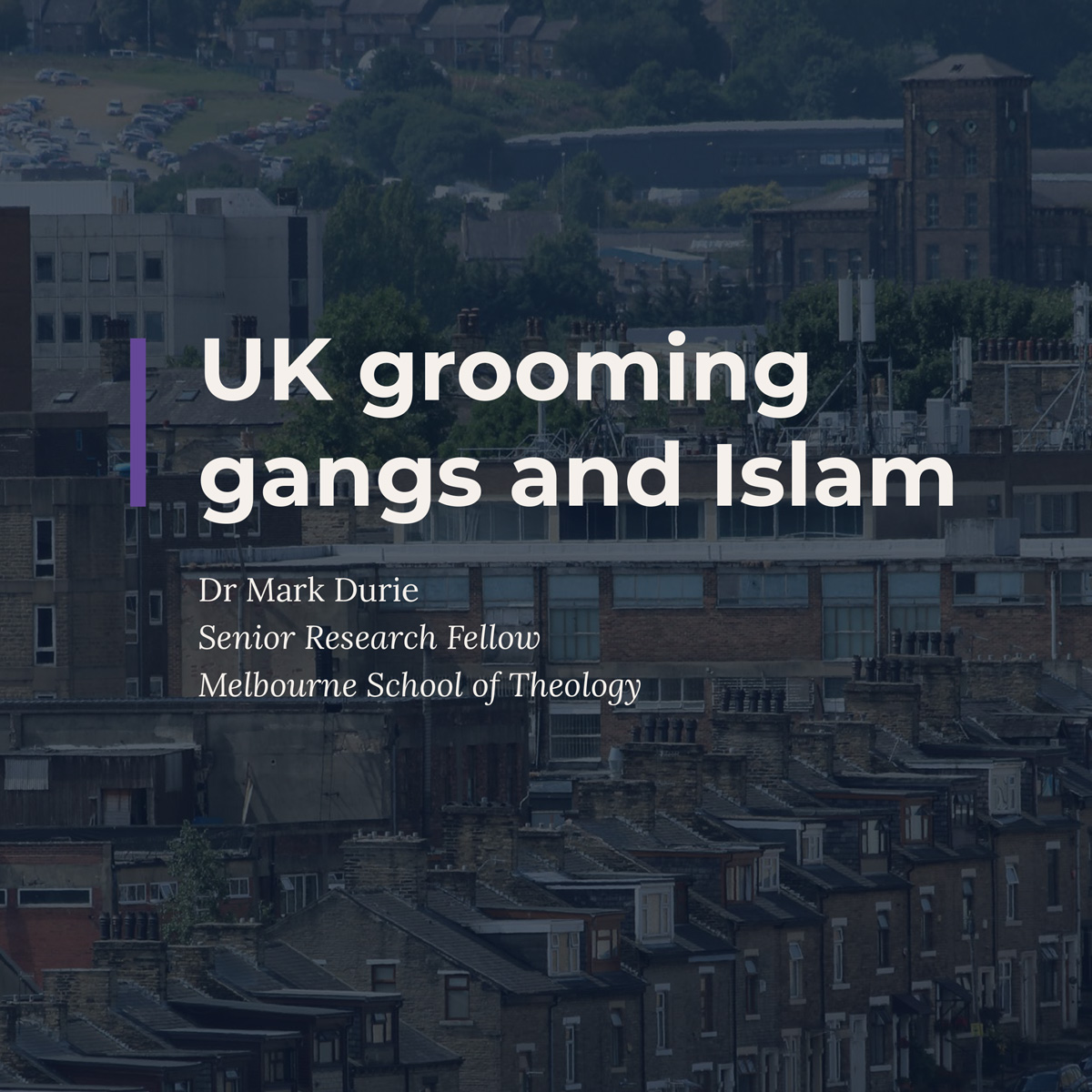Dr Mark Durie has argued in a new detailed report published by Christian Concern that the religion of Islam is more connected with UK grooming gang criminality than ethnicity.
Durie’s report explores possible influences of Islamic theology and law on the grooming gang phenomenon in the UK, in which organised gangs of mainly Muslim men have intimidated, controlled, raped, tortured and sexually exploited underage girls, most of whom have been white non-Muslims. Both victims and perpetrators number in the thousands.
Commentary on the grooming gangs has at times focused on ethnicity, while avoiding reference to religion as a potential driver of the abuse. The “Asian” ethnic label has been misleading as both too broad and too narrow, obscuring the actual pattern of abuse. In reality, the Islamic religion has a stronger correlation than ethnicity with grooming gang criminality: there is prima facie evidence that in the majority of cases the abusers have been Muslims.
Dr Mark Durie, is a Senior Research Fellow at the Arthur Jeffery Centre for the Study of Islam at Melbourne School of Theology. A theologian, author and Anglican pastor. He has published many articles and books on linguistics, Islam, Christian-Muslim relations, mission and religious freedom. His books on Islam include The Third Choice, Liberty to the Captives and The Qur’an and its Biblical Reflexes.

Eight aspects of Islamic law and theology
The report identifies eight aspects of Islamic law and theology that are proposed to influence and enable the grooming gangs’ criminality. It is emphasised that religious drivers can motivate behaviours which are strictly speaking prohibited by the religion’s teachings.
The eight factors are:
- The doctrine of the superiority of Muslims over non-Muslims.
- The doctrine of loyalty and disavowal, also known as ‘love and hate for the sake of God’.
- The superiority and dominance of men over women.
- The mandated seclusion of women by men.
- The religious practice of forced marriage, and the lack of a concept of an age of consent.
- The perceived threat of dangerous female sexuality.
- The practice of sex slavery as an aspect of the laws of jihad.
- Dhimmitude and the treatment of conquered non-Muslim peoples in Islamic law.
The report concludes with the following recommendations:
- Fears of stoking Islamophobia should not be allowed to skuttle transparent investigation of the grooming gangs’ religious cultures.
- The religious identities of both perpetrators and victims should be rigorously recorded.
- Police should be trained to interview grooming gang suspects concerning their religious beliefs.
- Police should also be trained to investigate religious aspects of the testimony of victims.
- The state should enforce a legal prohibition of unregistered sharia marriages.
- The role of abusers’ family members in enabling abuses must be considered.
- Islamic religious leaders should be called upon to disavow the activities of grooming gangs as well as certain religious beliefs which have enabled grooming gang activities.
- Politicians should refrain from making dismissive but ignorant claims concerning what Islam does and doesn’t teach about human sexual relations.
- It must be publicly acknowledged that there are Muslims who reject key elements of the grooming gangs’ religious cultures.
- The UK Forced Marriage Unit should remove statements on its website that there is no religious basis to forced marriages in Islam.
- Awareness training should be provided to vulnerable white working-class communities who are being targeted by grooming gangs. (The Sikh community already have programs which could be used as a model.)
‘Any inquiry must honestly and openly consider the religious motivations’
Andrea Williams, Chief Executive of Christian Concern said:
“Grooming gangs were allowed to operate for decades because those in authority were concerned about political correctness.
“If we are serious about learning these lessons and tackling these gangs, we have to talk openly about how they are influenced by Islamic doctrine and culture. It is just not good enough to call them ‘Asian’ grooming gangs, or even ‘Pakistani grooming gangs’.
“This report shows how much Islamic theology can be used to justify the abuse of grooming gangs. People should be able to discuss this without being accused of being Islamophobic.
“This government has resisted a national public inquiry into grooming gangs and resisted acknowledging any connection with Islam. We need to see a full national inquiry chaired by a judge which takes into account the findings of this important report on the Islamic connections.
“Any inquiry must honestly and openly consider the religious motivations and justifications of grooming gang abuse.
“The government must not adopt an official definition of ‘Islamophobia’ which in any way hinders open discussion on the religious aspects of grooming gangs.
“By avoiding discussing the religious aspects of grooming gangs, politicians and the media have perpetuated the problem of not properly listening to survivors. It is time for this to end.
“I hope that this report is widely read by politicians and media commentators and by all those involved in any inquiry into grooming gangs.”
Watch our livestream with Mark Durie on 24 November at 9pm GMT:

